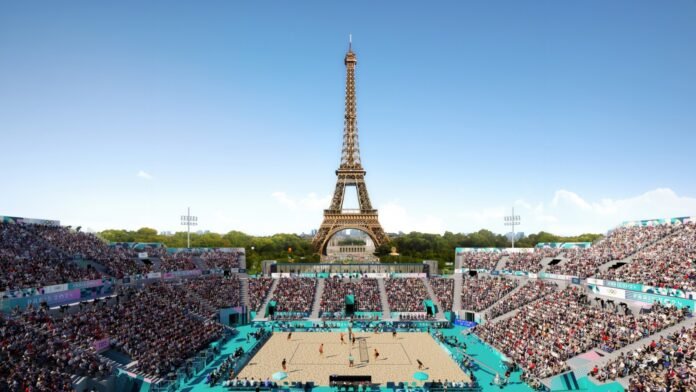
In a significant shift from initial plans, tourists flocking to Paris for the much-anticipated Olympics have been informed of a major alteration regarding the opening ceremony.
In a recent announcement, the French government disclosed that previously promised free access to the ceremony will no longer be available to the public due to security and logistical apprehensions.
Originally slated for July 26, the opening ceremony was envisioned as a grand spectacle welcoming up to 600,000 spectators, with most expected to view the extravaganza gratis from the picturesque riverbanks of the Seine.
However, mounting security challenges and concerns voiced by local businesses, notably booksellers along the scenic quays, have prompted authorities to revise their plans drastically.
Interior Minister Gérald Darmanin revealed that the total number of spectators has been trimmed to approximately 300,000, with 104,000 individuals securing paid tickets for prime spots along the lower riverbanks.
Another 222,000 attendees will still enjoy complimentary viewing from the upper banks, albeit with a crucial change—access will now be by invitation only.
Minister Darmanin explained the rationale behind this decision, emphasizing the imperative to manage crowd movements efficiently in light of prevailing security threats, particularly recent terrorist incidents.
“For security reasons that everyone understands, notably the terrorist threat of recent weeks, we are obliged to make it free but contained,” he stated.
This alteration implies that tourists will no longer have the opportunity to avail themselves of free entry as initially envisaged.
Instead, access to the ceremony will be allocated via quotas to select residents of towns hosting Olympic events, local sports federations, and other individuals chosen by organizers or their affiliates.
The Ministry of Interior clarified that local town councils will have the prerogative to extend invitations to various groups, including employees, youth from local sports clubs, and their families.
However, those fortunate enough to receive invitations will be subjected to stringent security screenings and provided with QR codes to facilitate passage through security checkpoints.
Amidst heightened vigilance, Minister Darmanin assured the public that intelligence services had not pinpointed any specific threats targeting the Olympics.
Nonetheless, he underscored the existence of multiple potential risks, encompassing Islamic extremist groups, violent environmental activists, ultra-right factions, and the looming spectre of cyberattacks originating from adversarial nations like Russia.
France, scarred by a spate of deadly attacks attributed to the Islamic State group in 2015-16, remains on edge, with sporadic incidents of extremist violence persisting in subsequent years.
In response, intelligence agencies have undertaken meticulous checks on approximately one million individuals slated to participate in, work for, or access Paris 2024. Of the 89,000 individuals scrutinized thus far, 280 have been denied access due to prior police records or other security concerns.
This edition of the Olympics marks a historic departure from tradition, with the opening ceremony unfolding outside the confines of a stadium.
Aligning with the theme of “Games Wide Open”, espoused by Paris organizers, an estimated 10,500 athletes will parade through the heart of the French capital aboard boats navigating the Seine along a 6-kilometer route.
Anticipating the presence of around 160 heads of state, the French government has announced sweeping security measures, including the closure of all airports and airspace within a 150-kilometer radius around Paris before, during, and after the 3½-hour ceremony.
As Paris braces itself for the spectacle and spectacle-seekers adjust to the revised admission protocols, the city remains steadfast in its commitment to hosting a safe and unforgettable Olympic Games experience.
This article was created using automation technology and was thoroughly edited and fact-checked by one of our editorial staff members